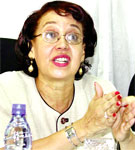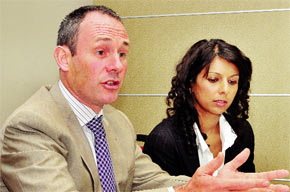CLOSE TO 2,000 DELEGATES ARE EXPECTED TO ATTEND INVESTORS CONFERENCE IN UGANDA NEXT WEEK
Writes Leo Odera Omolo in Kisumu City
Experts will speak on infrastructure, public-private partnership
Uganda will host the third session of the East African Community (EAC) Investment Conference from April 27 – 30.
In an interview with David Mugabe and Isaac Omoding, Dr. Maggie Kigozi, the executive director of Uganda Investment Authority (UIA), details the expected outcome and benefits for Uganda as host and for EAC as a region.

Maggie Kigozi talks about UIA performance
Below are excerpts
How many and what category of people are coming for the EAC conference?
We are targeting about 2,000 business people.
We have participants from the five EAC countries. As the host, we have 500 people and we expect 250 business people from the other countries.
We have approached every country’s chamber of commerce, manufacturers associations and all our partners in investment promotion agencies.
We will also have the five presidents and EAC ministers under their chair, Tanzania.
As host, are there any special surprises for our guests coming for the conference?
We have opportunities in the mining and petroleum sector which we did not have before.
Uganda is blessed. We have the people and the market. Our people are high-end and educated.
I meet an investor in petroleum twice a week from all over the world.
They want to see how they can get a foot in.
Unfortunately, we have halted further exploration for the time being.
We need to see how the refinery will work and how the regulation, policy and the relation between the Government and private sector will work. So for now we are focusing on five and value addition.
As EAC, we have the common market coming up. We have plans for the regional rail, roads and sharing energy. These are some of the new additions.
What can the EAC say has been the quantifiable gains out of the past two conferences?
One thing we do in these conferences is we meet a lot of investors.
Star Communications, the fellows providing digital TV, I met them in Rwanda and now they are in the four EAC countries. I am happy ours is now up and running.
KCB was able to meet all the countries at a single conference. There is a hotelier I met in Kenya who is quite advanced in putting three-star hotels around the country and he is here already.
We also learn about one another. We have experts coming in and speaking on infrastructure, public-private partnership and policy issues at EAC and government level.
As a host what will Uganda benefit?
First of all we are bringing our hotel industry about 1,500 guests, which is a big plus.
But these are not just guests, they are investors.
Getting investors to see Uganda is one of the most difficult things for us as an investment promotion agency. We have people who ask questions like where will I sleep, is there food?
So to bring them here and they see the beautiful Munyonyo is a step forward. I think the most interesting thing about Uganda is that people do not sleep.
The night life is terrific, at 11 pm, Abaita ababiri (Entebbe Road) is booming. We are also providing them with tourism opportunities to go and visit the gorillas and other national parks.
What are the criteria for winning the EA investor of the year award?
This year we have not had enough time to study the companies thoroughly so we are just looking at companies that do businesses regionally.
It is an advantage if the firm has invested in more than one EA country. If you have invested in all five, you have an added advantage.
Then we look at companies that export within the region and outside the region and how the companies stand in the community.
Any lessons learned from the last conference?
Yes, we used to bring the heads of state at the beginning but they require a lot of attention and, therefore, we don’t focus on investors. So this time they are coming in at the end, apart from the host President who will open the conference.
The last conference was in Nairobi and the venue was a bit small. All the Kenyans wanted to attend. Here we have a nice big room where we shall fit 2,000 people at Speke Resort Munyonyo. We have also tried to get the invitations in earlier.
Ever since the UIA was incorporated, how much investment value has it attracted?
As an agency we have licensed about 5,000 projects. The ones that came recently are in the process of setting up but the older ones are running.
That translates to how many jobs?
The accumulated planned investment is about $12b.
The jobs are 440,000. For each job in a company, there are at least eight other job linkages either as suppliers, farmers, raw materials, transport or packaging.
What is the difference between planned and actual investments?
Planned investment is what investors target when they are coming here.
For some of them the plan goes completely out of hand when they reach here. A good example is MTN. We had them licensed with $20m.
Now they are well over $600m. Then there are those that do not find the market good so they abandon the market. You remember AES power for various reasons was not able to take off.
How far have plans gone in promoting the region as a single destination?
Actually for investment we started long time ago.
We formed the association of investment agencies of East Africa in 2001. We have since developed a guide for the countries.
The private sector look at it suspiciously as competition or that people will take their market but for us it is very clear that investors want a big market.
Since the EAC put in place a secretariat we now have an office since about four years ago and the first thing we did was to launch the EA investment conference.
As a country, how are we positioning to sell the country and its diversity?
We have an exhibition. We have about 20 square meters for each country.
We have UWA and UTB and UEPB plus a number of our private companies. Even within the presentations we have discussions on mining, tourism and we are updating the tourism videos.
Most of the investments are located in central, how are you going to change this to see that this spreads out?
That was the truth a few years ago because the infrastructure and the markets were here.
But I am happy to report that that is changing. We have in place UIA district focal point officers in all the districts and they have worked on what the districts have to offer.
It is very difficult to promote somebody who is negative about themselves, we have this problem with Jinja which improves slightly and then goes down to zero.
We are putting up 22 economic zones.
We have a couple of successes, last week we launched Mount Meru in Lira (contract farming for sunflower) where there is Mukwano and the shea nut butter project.
What is the status of Namanve?
Namanve is ready.
We have allocated land to 230 investors. In the logistics park we have about 70 companies so in total we have about 300 companies.
Since the last competitive report was released, what changes have you made?
We are working on the registration of companies and we have a World Bank funded project.
We have got a new board, but the legislation is still slow. It is a huge problem and it will not go overnight.
Temporarily for us, we have a one stop shop. The financial sector is booming.
We have the best labour laws, we are number 11 in the world.
Talking about commercial laws, the investment code was supposed to be amended, how far have you gone with the process?
We have worked on it and it has passed through cabinet. But it has to be pushed further through Parliament. It is now in the Ministry of Finance.
We need to update 44 commercial laws that are in the pipeline. We have managed to pass about five.
But even the ones we have passed, the regulation is not in place and it does not help to have a modern law but it cannot be regulated. That is an area where we have been very weak in.
What challenges do you face in promoting investment?
Infrastructure, access to finance, lack of land and the bureaucracy within government, these are the key ones.
The old laws do not allow for efficiency. For immigration as an example, the board has got to sit to issue a work permit, now how often does a board sit? This means I have to wait for my work permit.
There is lack of understanding of the private sector within government. They are slow, speed is not of essence meanwhile the investor is losing money.
Ends


